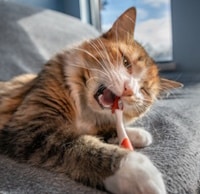 Keeping your pets healthy is a responsibility that stretches beyond regular vet visits and a balanced diet. Oral hygiene, specifically cleaning your cat’s teeth, often goes overlooked but is of paramount importance. Just as with humans, neglecting dental care can lead to a myriad of health issues for your feline friend.
Keeping your pets healthy is a responsibility that stretches beyond regular vet visits and a balanced diet. Oral hygiene, specifically cleaning your cat’s teeth, often goes overlooked but is of paramount importance. Just as with humans, neglecting dental care can lead to a myriad of health issues for your feline friend.
The Importance of Cleaning Your Cat’s Teeth
Cats are susceptible to dental problems. Plaque and tartar can build up over time, leading to gum disease, bad breath, and even tooth loss. Regular brushing helps to mitigate these risks, ensuring that your cat maintains a healthy mouth throughout its life.
Different Methods to Clean Your Cat’s Teeth
-
Toothbrush and Toothpaste
The most common method involves using a specialized cat toothbrush and toothpaste. Human toothpaste is not suitable due to its fluoride content which can be toxic to cats. Instead, choose a toothpaste formulated specifically for felines.
-
Dental Wipes
If your cat isn’t fond of a toothbrush, dental wipes can be a suitable alternative. They effectively remove plaque but might not be as thorough as brushing.
-
Dental Toys and Treats
Some toys and treats are designed to help with dental cleaning. They are textured to help remove plaque as your cat chews.
-
Professional Cleanings
If you’re not confident in your ability to brush your cat’s teeth or if your cat is particularly resistant, consider professional cleanings at your local veterinarian hospital.
Benefits of Cleaning Your Cat’s Teeth
-
Disease Prevention
Regular teeth cleaning can prevent diseases like periodontal disease, which is caused by tartar buildup.
-
Fresh Breath
A clean mouth means less bad breath. If you have ever been close to a cat with dental issues, you know how valuable this benefit is!
-
Longevity
Good dental health can extend your cat’s life. Dental issues can lead to other health problems if bacteria enter the bloodstream.
-
Avoid Costly Vet Bills
Addressing dental issues early can prevent costly procedures in the future.
Dangers of Not Cleaning Your Cat’s Teeth
-
Tooth Decay and Loss
Without regular cleaning, plaque builds up and can lead to tooth decay and even tooth loss.
-
Pain and Discomfort
Tooth problems can cause significant pain. Cats are known for hiding their discomfort, so by the time you notice, the issue might be severe.
-
Potential for Other Health
Poor dental health can lead to heart, kidney, and liver problems if bacteria from the month spend through the body.
-
Making Teeth Cleaning Routine
It’s not just about knowing the importance of cat teeth cleaning. It’s also about making it a regular routine. Many cat owners may be daunted by the thought of brushing their cat’s teeth, fearing scratches or bites. But, like all things, it’s a matter of patience and consistency.
Tips to Start the Teeth Cleaning Journey
-
Start Early
The younger the cat, the easier it will be to acclimate them to teeth cleaning. If you’ve adopted a kitten, start introducing them to the process gradually.
-
Choose the Right Time
Cats are creatures of habit. Find a time when your cat is most relaxed, perhaps after a meal or playtime, and make that your regular brushing time.
-
Use Positive Reinforcement
Treats, praises, and gentle petting can make a world of difference. Every time you brush your cat’s teeth, reward them with a treat or their favorite toy.
-
Gradual Introduction
Don’t jump straight into a full brushing session. Start by letting your cat taste the toothpaste. Then, introduce the brush without any paste, gently rubbing it against their teeth. Over time, as they become more accustomed, you can begin the full brushing routine.
-
Regular Vet Check-ups
Even with diligent home care, it’s essential to have your cat’s teeth checked by a veterinarian annually. They can provide a thorough cleaning and spot potential issues early on.
The Challenges and Overcoming Them
It’s worth noting that not every cat will take to teeth cleaning easily. Some might resist more than others, and that’s okay. The key is persistence and patience.
-
Biting and Scratching
Use a cat muzzle or seek assistance from another family member to keep the cat calm during the initial stages.
-
Resistance to Toothpaste
There are different flavors available. If one doesn’t work, try another until you find one your cat likes.
-
Fear of the Brush
In such cases, dental wipes or toys can be an interim solution until your cat becomes more accustomed to the idea of brushing.
Common Misconceptions About Cat Dental Care
As cat teeth cleaning becomes a more prevalent topic among pet owners, there are a few misconceptions that have arisen. Let’s debunk some of these myths to ensure you’re on the right path.
- “Cat naturally clean their teeth while chewing their food.” While it’s true that the act of chewing can help remove some surface plaque, it doesn’t reach the gumline where most dental problems arise. Relying solely on this notion can lead to dental issues down the line.
- “Dry food is better for dental hygiene than wet.” The crunchiness of dry food can assist in removing some plaque, but it’s not a definitive solution.
- “Bad Breath in cats is normal.” Bad breath can be an early sign of dental disease. While it’s common for your feline’s breath not to be entirely fresh, a particularly foul odor might indicate underlying issues and warrants a vet check.
The Role of Diet in Dental Health
Diet plays a crucial role in overall health. Some tips to ensure your cat’s diet supports good dental hygiene are:
- Balanced Nutrition
Ensure your cat’s diet is balanced with all essential nutrients. Some specific dental diets are formulated to promote oral health.
- Provide Dental Treats:
There are special treats available in the market which are designed to reduce plaque and tartar buildup. They can be a supplementary aid, but not a replacement for brushing.
- Fresh Water
Always ensure your cat has access to fresh water. Drinking water helps wash away food particles and can reduce the buildup of harmful bacteria in the mouth.
Recognizing the Signs of Dental Issues
Between those vet visits, it’s essential to be vigilant. While cats are masters at hiding pain, there are subtle signs that can indicate dental problems:
-
Changing in Eating Habits
A cat that suddenly shows disinterest in food or has difficulty chewing might be experiencing dental pain.
-
Excessive Drooling
While some drooling can be normal, especially during purring or relaxation, sudden and excessive drooling might indicate oral issues.
-
Visible Plaque or Discoloration
Regularly inspect your cat’s teeth. If you see yellow or brown buildup or noticed inflamed gums, it’s time for a dental check-up.
-
Pawing at the Mouth
If your cat frequently paws at their mouth or face, it might be trying to alleviate discomfort or pain.
Your journey with your cat is one filled with learning and adapting. As with all aspects of care, diligence, and love are at the forefront of dental health. By understanding the depth of its importance, actively seeking knowledge, and implementing regular care routines, you’ve ensured that your feline companions stay healthy and content, flashing that cute, clean set of teeth for many years to come. Remember, it’s not just about avoiding dental issues, but about enhancing the quality of life for your cherished pet.
For more tips on pet care and health, feel free to reach out to Hampton Park Veterinary Hospital or schedule an appointment with our expert veterinarians. Your pet deserves the best care, both at home and in our clinic!

